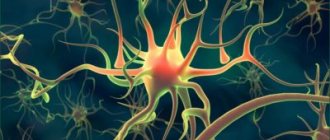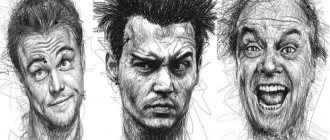Updated July 24, 2021 613 Author: Dmitry Petrov
Hello, dear readers of the KtoNaNovenkogo.ru blog. Homo sapiens cannot exist without activity. Thanks to it, the formation and development of personality occurs, recognition of one’s needs and their satisfaction.
Such activity contributes to the development and improvement of all humanity. What is activity, what does it consist of and what types of it exist, you will learn from this article.
Definition of activity - what is it?
Synonyms for the word “activity” are words such as: labor, action, business, work, that is, it represents any type of activity that has meaning and is therefore conscious.
This is a process in which two parties always interact: subject and object. The first is the one who actually does something (he is also called the doer). The object, in turn, is what the actions of the subject are directed towards with a specific purpose.
In philosophy, this term represents a spiritual form: after all, in order to do something, we need will (what is it?), which is one of the components of the spirit. The will is based on the values that a person strives to achieve through actions.
If you love beauty, then create art, if you want true knowledge, go to science, economic activity brings benefits to society, and those seeking justice promote morality (what is this?).
For a deeper understanding of the term, you need to know :
- activity is what transforms the world around us. If animals simply adapt to almost any conditions, then man strives to improve the environment in which he finds himself;
- activity is always connected with creativity, since only by going beyond the boundaries of the known and familiar, we are able to create something new.
Just above is a video that examines in detail the issue of human activity within the framework of the school social studies . A very clear and short story. I highly recommend listening.
How to choose a field of activity
It is very important for a person to “find himself” in this life and a business in which he can realize himself 100%. If for some reason a person does not apply himself correctly, then at best he will plunge into an endless search for his destiny, and at worst he will become a failure, doing work that is unnatural for himself, and drag out a miserable and dull existence for the rest of his life. Therefore, it is imperative to take into account your individual characteristics and direct them in the right direction in time. You can become a famous and honored surgeon, build a successful business or lead the country to prosperity only by being in your place. Otherwise, a person will lose both his personal and professional qualities.
You may like: Real estate and its resale as a business idea
So, first of all, you need to decide what you like best. Many people do not make decisions on their own; teachers, parents, neighbors and peers do it for them. Compare your desires and capabilities, and then analyze the result. Next, think about the necessary skills you need to do what you love. Maybe you already know how to do something. This may become a direction for your future activities. For example, you really love animals. Now you should consider similar vacancies in the labor market: animal protection, veterinary work, animal care, training, sewing clothes for animals and food supply, it could also be opening your own pet store. As soon as you decide on a profession, begin to develop the necessary skills.
You need to think carefully about choosing a field of activity. The concept of field of activity is much broader than just a profession. You must have an idea of your field as a whole - this will give you the opportunity to master at least five professions in your field. For example, if you are an engineer by profession, you can also work as an administrator, office manager, teacher and consultant. If you study law, you may well become a lawyer in a large company or non-profit organization, the head of a department (not necessarily a legal one), a manager or an author of textbooks. Remember that the field of activity can expand depending on your efforts and desires to develop.
Don't get hung up on one thing. When working on yourself, sometimes you need to break away and look around. For example, many teachers have a good vocabulary, which means they can become excellent editors. Don't stop there. You can learn more about the skills needed for the job you are interested in through books and the Internet. Schools, municipal service centers or universities will also help you choose a profession. They will help you decide in which area you want to continue your education.
Try to find people who are already working in this specialty. This is very useful because you will be able to learn first-hand about the pros and cons of this job. If you're lucky, they'll even let you try to do something yourself for practice. Don’t forget to evaluate and weigh everything you heard, all the pros and cons. It’s better to think twice and make the right decision, taking into account all the factors, than to regret what you did later.
You can enroll in an educational or training program in the specialty you have chosen. This way you can gain valuable experience and meet people in your field. In addition, this will provide an opportunity to take the first steps on the career ladder and meet new people. New subjects will improve your professional skills and open up new horizons for you.
And finally, always be prepared for big changes, try to keep up with the times, despite the difficulties. Don't forget that you are unique, and employers are looking for just such employees.
Types of human activities
All types are divided according to the method of implementation into material (practical) and spiritual.
- The practical form includes the transformation of the material, material world (nature and society). For example, the production of goods or construction. Practical activities are divided into: Material and production - the object is nature, and the result is material goods.
- Socially transformative - the object is society, and the result is a change in social relations.
Its subspecies include:
- Cognitive activity, the result of which is knowledge.
Value-oriented, as a result of which a person’s worldview is formed.
These types are interconnected (practical and spiritual).
For example, the results of spiritual activity (music, scientific achievements) are captured using a practical form (printing notes, publishing books). Well, the practical form, in turn, is impossible without the spiritual (idea).
Another classification of activities is based on the ways of forming a person as an individual. Psychologists have identified several types of activities.
- Gaming – the leading activity in children, there is no goal as such (the process itself is important), is a way of understanding the world. In the game, through imitation of reality, knowledge of the environment is carried out. It is conditional in nature (imaginary situations are played out), but certain rules and norms are followed.
This is the only type of activity that is characteristic not only of people, but also of animals. - Academic – acquiring skills and discovering abilities that will help you live a happier, more comfortable and successful life. Studying may not always be purposeful. Often a person acquires knowledge spontaneously (from TV, movies, books, the Internet). The student does not create new knowledge, but only masters existing knowledge.
- Labor is the interaction of a person with the outside world, aimed at creating a socially useful product (material and spiritual) that helps improve the standard of living of society.
The components of labor are the knowledge and skills of a person, as well as his skill. Work is carried out out of necessity, but at the same time transforms the world around us. It is aimed at obtaining a socially useful result, in contrast to a game in which the main thing is the process. - Communication activities are aimed at the exchange of information, emotions, feelings, assessments and specific actions.
The peculiarity is that it requires a partner (an equal subject of communication) and the use of speech (language). Communication helps a person become an individual, develop communication skills, express himself, gain new knowledge (this type is present in all others). - Creative – any type of activity that leads to a unique result (the creation of something qualitatively new).
It is distinguished by uniqueness, originality and uniqueness of ideas. Important components for creativity are intuition (anticipation of the result), imagination and fantasy. Creativity is included in almost all types of human activity, as well as communication.
A few words about the essence of commercial and non-commercial areas
Commercial activity is all areas of work and business that bring financial profit to a specific person or group of people. Non-profit work, accordingly, has other implementation goals.
Despite the general understanding of this interpretation, it is not easy to understand the essence of commercial and non-commercial spheres. That is why the legislation of the Russian Federation regulates the concepts of different types of activities for both citizens and legal entities, individual entrepreneurs.
Their essence can be analyzed by referring to the following legislative acts:
Variety of areas of activity
- Classifier OKVED containing a description of all types of commercial areas of activity.
- The Federal Law “On Non-Profit Organizations”, which makes it possible to distinguish the essence of commercial areas from non-profit ones using clear examples.
If for hired workers determining the nature of their work or the vector of the enterprise’s activity is an unnecessary thing, then for owners of organizations and individual entrepreneurs the noted concepts are important from all points of view. Taking into account the scope of activity and its type, the final type of ownership of the enterprise, the taxation system and other important aspects of the business are determined. This state of affairs simply obliges businessmen to take the proper level of responsibility to analyze their current or future business, as well as study the legislative acts discussed above.
To understand the degree of importance of such manipulations, let us pay attention to one simple example - the work of an ordinary artist working for himself, not for hire. At the time of painting, he is a commercial figure, since he is not paid money for the painting. However, when selling painted canvases, the artist becomes a seller implementing a full-fledged commercial activity.
The ability to differentiate, correctly interpret and use such legislative nuances regarding the types of areas of activity is extremely important. At a minimum, for current or future businessmen.
Human needs
It is said above that activity is a conscious process endowed with meaning. That is, if you do something, you understand why you need it . How is meaning born? Initially, you realize that you need something.
For example, your stomach growls, you realize a need - hunger - and go to the kitchen to prepare food for yourself. If you did not understand your feelings, and specifically, did not recognize the feeling of hunger, then no further action would have followed.
Thus, a need is a need for something.
There are many classifications of this phenomenon, but the most frequently used is “Abraham Maslow’s pyramid of needs” (American behavioral psychologist).
Studying human behavior, he came to the conclusion that in addition to short-term needs (buying a car), which change throughout life, there are basic needs . The latter represent the basis of a happy existence, provided they are satisfied.
- Physiological - the simplest, but vital needs - sleep, food, air, clothing, etc. This is the very first, primitive level (this is how newborns live).
- The need for security is necessary for mental peace, because only then can we develop effectively and feel comfortable (the parents are called upon to provide this need to the child).
- Social needs are variously expressed desires to be with people, to feel part of a family, class, group, country, to belong to people like me. A person cannot live and develop outside of society (adolescents).
- Esteem Need – We want to be leaders, valued members of society, loved and appreciated (by adults).
- The need for self-actualization or self-expression is the highest level of needs, which not everyone achieves. Here the individual needs creative development, dissemination of his skills and knowledge, thus expressing his inner “I” (mature people).
A little later, Maslow supplemented his classification with three more types of needs: cognitive (the desire to explore, discover), aesthetic (the desire for harmony and beauty) and transcendental (the selfless transfer of one’s own experience for the purpose of self-improvement of other people).
Factors that influence the effective performance of professional activities
Every person is ready to work if he has an interest in work. In order for professional activity to come first, motivation for success is necessary. If a person sees meaning in the future, then he will strive for improvement.
There is an opinion that there are two factors that will help stimulate an individual to professional activity:
1. Material factors.
- An agreement is concluded on the binding of material remuneration. If employees are stimulated financially, then work efficiency will be increased. This affects the material well-being of the entire enterprise as a whole.
- Bonuses for employees. If a person knows that he will receive a bonus for a job well done, then he will give his best in his professional activities.
- Increase in salary for qualifications. Additional funding for the best employees will provide an incentive for other people to work better.
- Providing benefits. It is more pleasant for every person to work if travel or food (partially or fully), trips to the sea, and camp sites are paid for.
2. Psychological factors.
- Celebration organization. Employees will be happy to relax with colleagues after working days. These days they are happy not to think about work, but to communicate with each other on abstract topics.
- Writing certificates and thanks stimulates a person to work. He understands that he brings benefits to his enterprise. This increases labor productivity.
- The regime is not only for work moments, but also for rest. Every employee is pleased to know that at the workplace he can not only work, but also relax.
- Professional growth (career). If a person knows that improvement awaits him in the future, he will be able to strive for improvement. To do this, it is necessary to create the necessary conditions for employees: update knowledge and skills (organize a variety of courses and trainings to improve their skills).
- Professional activity involves creating conditions for friendly relations with colleagues. A good team atmosphere will make work more enjoyable.
Ensuring professional performance will help employees adhere to these factors. As a result, you will be able to increase profits at the company, as well as improve product quality, prestige and labor potential through friendly relations in the team.
Motive of human activity
After realizing the need, a motive for activity appears - this is an internal urge to achieve what you want. It is formed by additional factors: traditions (what is it?), beliefs, attitudes, interests, and so on.
For example, a girl with the conviction that she must get married devotes the lion's share of her time to searching for a groom. That is, the need for marriage (to have a family, to be a member of it) becomes the motive for her activity.
Professional organizations and their activities
Every enterprise or firm wants to have highly qualified employees. Therefore, many organizations can safely be called professional. They bring together only the best employees who are completely dedicated to their work.
The activities of professional organizations are aimed at mutual assistance to others and their colleagues. That is, each employee tries to invest their knowledge, work and skills in this area, and shows interest in professional activities. It is on such people that wages depend. In many enterprises or organizations, payment is based on the quality and quantity of output.
If employees are encouraged and rewarded for their work, then each person will become even more interested in their work. After all, he will work with the understanding that he will receive a reward for an effectively completed task.
At each enterprise, a structure of activity is determined, which describes working moments and operations. It is very important for employees to create conditions so that they feel safe in the workplace. In this case, the labor process at the enterprise is guaranteed to be productive.
Target
When internal motivation takes place, we begin to build an image in our head of what we want to achieve in the end. A girl who wants to get married begins to think about what her future husband should be like: age, eye color, social status, nationality, appearance, etc. Thus, she paints for herself a clear picture of what she actually needs to strive for.
Goal setting is an integral part of human activity.
We first create something in our minds, then we try to bring it to life. Animals, unlike us, are guided only by instincts: they do not think about what, how and why they do something. When choosing a female, a wolf does not walk through the forest for 3 years looking for a she-wolf with the most beautiful fur, but a person is quite capable of this.
Maybe this is our happiness - we can choose and adjust our goals.
Diagnosis of the state of life spheres
Now that we have reviewed the entire list of areas and studied their characteristics, you can independently assess the condition of each. Answer the following questions honestly for each area:
- Have you achieved any success in this area?
- Does it bring you pleasure?
- Do you spend time with her at least once a week?
- Do people around you praise you for your achievements in this area?
Be completely honest with yourself. Only in this case will you have a chance to improve your life and get a boost to development. Those areas in which the majority of answers are positive, you are doing well. And those with more than two negative answers will have to be worked on.
Means to achieve the goal
So, I see the goal. I'm going to see her. At this stage we choose the means to achieve what we want. By means here we mean anything - anything that will help you achieve your goal. If you want to become a good cook, you will have to graduate from culinary school, gain experience, and constantly improve your skills by learning new skills.
It is important to know: firstly, the means and the end must be proportionate . For example, you want to make money, you open a personal business (flower shop), but in the end your enterprise operates at a loss. A reasonable person understands that in this way he will never improve his well-being and will try something else - the means will not justify the end.
Secondly, the means must be in the moral category . If this is not so, then all human activity is immoral. Violating the law, lying to achieve personal gain, betraying loved ones for the sake of your goal is immoral. In this case, the end does not justify the means.
Sphere of work
Determining the scope of work and choosing a profession is one of the most difficult processes. It requires taking into account both personal interests, inclinations, abilities, as well as the demand for a particular profession and the prospects for the development of sectors of the national economy.
According to various sources, in Russia there are more than 400 professions and from 7 to 13 thousand positions. Their list is constantly updated with the innovative development of both the professions themselves and with the expansion of international relations of the Russian economy and its individual industries and enterprises. Some new professions and positions do not have names in Russian: shopper - consultant for the purchase of stylish things; training manager - teaches company employees the subtleties of craftsmanship; merchandiser - looking for opportunities to sell his company's products in retail chains.
Technical progress and the use of the latest technologies in various industries are gradually determining the areas in which “dying” professions appear. Thus, security of an enterprise can be carried out without human participation, transport controlled by a robot appears, automated cash registers operate without a cashier.
Action
An action is a single element of activity.
The latter consists of a set of small steps interconnected. For example, to build a house, you first need to dig a foundation, build walls and a roof, and pour the floor.
Sociologist M. Weber identified 4 types of social actions :
- goal-oriented – striving to achieve a reasonable goal (preparing a speech before a speech);
- value-rational – focused on moral values (a soldier’s refusal to give up his country’s military secrets);
- affective - actions committed under the influence of feelings and emotions (a person in a rage can break something);
- traditional - habitual actions, rituals, customs (throwing a wedding bouquet into a crowd of bridesmaids, fireworks for the New Year);
The first two types underlie activity, the second two appear partially and are of an auxiliary nature.
Sphere of production of theoretical knowledge
When asking the question of what spheres of human activity modern society includes, one cannot help but mention a special sphere - scientific. Since the 17th century, scientific knowledge and exploration of the world has become an increasingly important area of application of human intellectual potential. Scientific knowledge is necessary in order to describe the current state of affairs, find its causes and make predictions. Scientific knowledge allows a person to comprehend the objective laws of the surrounding world. As a field of activity, science is also an area in which a person can realize and develop his potential and achieve self-realization. Science also aims to offer new ways to meet people's urgent needs.










